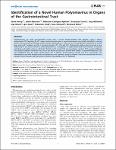Identification of a Novel Human Polyomavirus in Organs of the Gastrointestinal Tract
Korup, Sarah
Rietscher, Janita
Calvignac-Spencer, Sébastien
Trusch, Franziska
Hofmann, Jörg
Moens, Ugo
Sauer, Igor
Voigt, Sebastian
Schmuck, Rosa
Ehlers, Bernhard
Polyomaviruses are small, non-enveloped viruses with a circular double-stranded DNA genome. Using a generic polyomavirus PCR targeting the VP1 major structural protein gene, a novel polyomavirus was initially identified in resected human liver tissue and provisionally named Human Polyomavirus 12 (HPyV12). Its 5033 bp genome is predicted to encode large and small T antigens and the 3 structural proteins VP1, VP2 and VP3. Phylogenetic analyses did not reveal a close relationship to any known human or animal polyomavirus. Investigation of organs, body fluids and excretions of diseased individuals and healthy subjects with both HPyV12-specific nested PCR and quantitative real-time PCR revealed additional virus-positive samples of resected liver, cecum and rectum tissues and a positive fecal sample. A capsomer-based IgG ELISA was established using the major capsid protein VP1 of HPyV12. Seroprevalences of 23% and 17%, respectively, were determined in sera from healthy adults and adolescents and a pediatric group of children. These data indicate that the virus naturally infects humans and that primary infection may already occur in childhood.
Dateien zu dieser Publikation
Keine Lizenzangabe
Verwandte Publikationen
Anzeige der Publikationen mit ähnlichem Titel, Autor, Urheber und Thema.
-
2015-09-03ZeitschriftenartikelGenome Sequences of a Rat Polyomavirus Related to Murine Polyomavirus, Rattus norvegicus Polyomavirus 1 Ehlers, Bernhard; Richter, Dania; Matuschka, Franz-Rainer; Ulrich, Rainer G.We amplified and sequenced six complete genomes of a polyomavirus from feral Norway rats (Rattus norvegicus) and from a long-term breeding colony derived from Norway rats. This virus, which is closely related to hamster ...
-
2015-09-03ZeitschriftenartikelGenome Sequence of a Central Chimpanzee-Associated Polyomavirus Related to BK and JC Polyomaviruses, Pan troglodytes troglodytes Polyomavirus 1 Madinda, Nadège F.; Robbins, Martha M.; Boesch, Christophe; Leendertz, Fabian H.; Ehlers, Bernhard; Calvignac-Spencer, SébastienWe amplified and sequenced the genome of a polyomavirus infecting a central chimpanzee (Pan troglodytes troglodytes). This virus, which is closely related to BK and JC polyomaviruses, may help shed a new light on these ...
-
2010-11-03ZeitschriftenartikelAfrican great apes are naturally infected with polyomaviruses closely related to Merkel cell polyomavirus Leendertz, Fabian; Scuda, Nelly; Cameron, Kenneth; Kidega, Tonny; Zuberbühler, Klaus; Leendertz, Siv Aina J.; Couacy-Hymann, Emmanuel; Boesch, Christophe; Calvignac, Sébastien; Ehlers, BernhardThe oncogenic Merkel cell polyomavirus (MCPyV) infects humans worldwide, but little is known about the occurrence of viruses related to MCPyV in the closest phylogenetic relatives of humans, great apes. We analyzed samples ...

